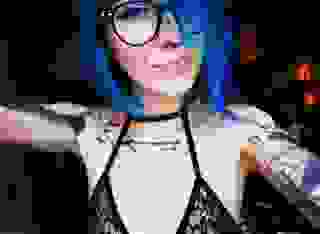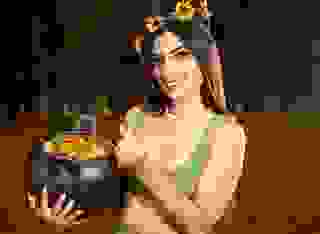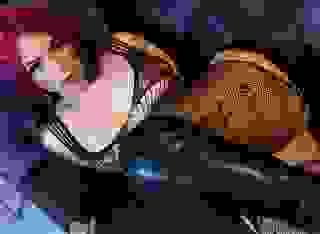Note: You can change font size, font face, and turn on dark mode by clicking the "A" icon tab in the Story Info Box.
You can temporarily switch back to a Classic Literotica® experience during our ongoing public Beta testing. Please consider leaving feedback on issues you experience or suggest improvements.
Click hereC'est la vie, right? Fear and paranoia are effective tools to manage public perception, for as Marshall McLuhan had so presciently pointed out just a few years before, The Medium is indeed the Massage, and Nixon was a master baiter.
+++++
As the three of us walked through the National Mall that night, everything began to snap into place. As Rand talked, I could clearly see why he had attached himself so furiously to Madeleine, why he was so existentially upset by her flight. It all seemed so obvious as we spoke, as we looked at protesters and mounted police riding among the makeshift tents and buses.
He too had been abused by his mother, she had abused him for years whenever his father was away, and then his father only deepened his sense of betrayal by not figuring it all out. We listened and learned that his brother had known about the abuse for years, and had tried to act, only to be forced from their little chateau and sent off to war, and onward -- to death. Rand's family, what was left of it, anyway, simply fell apart. He'd detested his mother at least as much as I did mine, but her suicide left him confused, severely conflicted, and very much concerned about that widening gyre.
He had been thinking about his mother a lot recently, and wondering what had happened to her as a child. Maybe her father had molested her? And then what? Maybe her father had been molested by his mother? We both saw it then as a hall of mirrors...you could go back and back in time forever and all you'd ever find to explain this never-ending chain of betrayal was an arrow of negation soaring off into infinity -- in both directions. No one could ever claim responsibility, for there could never be an accounting in such a circular system, just quiet blame without end -- throughout time.
Was this kind of abuse really so prevalent, I wondered aloud, and Shipman said that, yes, in his limited experience around boys at the school, it was. Sexual abuse was not simply common, he said, it's was almost taken for granted by the staff, and yet it was always a deep, dark secret. It wasn't, Shipman said, so much a hall of mirrors as it was guilt piled upon guilt. Perhaps all this abuse was, he said, an unforeseen by-product of the material excesses of the post-war economic boom, but Rand shot that down. There was nothing new about this, Rand said, ever the fatalist, because it's been happening forever. In his view, family dysfunction was just a small part of the widening gyre. Man's inability to learn from his mistakes, served family style.
+++++
Frank Lloyd Wrong thought it would be 'a gas' to take some balloons and fill them with red paint, then throw them on some cop cars or, better yet, some troops, and to that end they went to a hardware store early that morning and bought some paint, and a funnel. Madeleine found a bright assortment of balloons at a Woolworth's down the street from the motel, and they'd spend a messy forty five minutes filling balloons, laughing out loud when they thought of the effect the paint would produce on cop cars.
The television was on, and there was a story on the CBS Morning News about troops of the 82nd Airborne Division having been posted near the White House, in the old Executive Office Building, and there was speculation that Nixon was going to be moved to a safer location.
"I wonder what's going on down there," Madeleine said.
"Let's go see," Wrong said. "It's on our way to the Mall. We can check it out, then hit the rally!"
+++++
"So many secrets," Rand said as the sun came up. When he met Madeleine, he told us, it was like two souls adrift in space had come together, to souls lost in betrayal, and in the meeting both had seen the truth of their own existence -- one through the eyes of the other. Their chance meeting had, finally, set the stage for a greater release. Set free, like charged particles adrift in chaos, their attraction to one another absolute, now there was nothing the universe could do to prevent the inevitable collision.
+++++
Madeleine and Frank got a cab and made their way across town. Madeleine carried the paint filled balloons in a big book bag slung over her shoulder.
+++++
"There's no way we're going to find them out here!" Shipman said, standing tall and looking over the vast crowd. "There must be a hundred thousand people here already..."
"What should we do?" I asked no one in particular.
Of course, I was really asking Rand. If anyone, anywhere knew, it would have to be him. Madeleine and Rand were, I now saw, charged particles hurtling through the universe, doomed to fulfill an unfolding destiny we could not yet perceive.
Rand was listening to a group of protesters by the water's edge, and when he heard the words 'White' and 'House', he looked our way, then grabbed the sleeve of my jacket as he bolted past.
"C'mon, let's go!" he yelled. "I know where they are!"
It took us a few minutes, but we found the Nova and hurried the few blocks to Pennsylvania Avenue.
+++++
Madeleine and Frank were captivated by the boiling crowd around the White House. Nixon had called the protesters at Kent State "bums", while Ron Ziegler, Nixon's press secretary, uttered the most ironic in words in American history when he said "when dissent turns to violence, it invites tragedy." The most popular sign carried by protesters read "They Can't Kill Us All!", while on television the father of one of the girls slain at Kent State let the world know his little girl wasn't "a bum". Protesters by the White House gates overturned cars, other cars were dragged into intersections and set afire. Nixon was told the country had just entered a de facto state of civil war, and it was time to remove The President from The White House -- and get him to a secure location. Members of the 82nd Airborne, then standing-by in the basement of the Executive Office Building, were told to get up on the street and protect the President of the United States of America while he prepared to flee the nation's capitol.
+++++
We saw smoke, smoke from burning cars, mattresses burning on the sidewalks and in the street, and we saw hundreds of paratroopers streaming from the old EOB towards the White House. Paratroopers running towards a huge mass of protesters. Paratroopers with bayonets mounted on their M-16s, running at students armed with posters claiming 'They Can't Kill Us All!'.
"There she is!" Rand cried, and he was out the door and running even before the Chevy had screeched to a halt. Shipman and I tore out after him, and I saw Madeleine just then, maybe a hundred yards away.
+++++
"Give me some of those fuckin' balloons!" Frank Lloyd Wrong, Architect of Anarchy, said to my sister as they watched the Presidential motorcade leaving the White House gates. "We'll never get another chance like this!"
+++++
"What the fuck are they doing?" Shipman screamed into the smoke, but I was lost in the night, watching out over the foredeck as an iceberg slammed into the ship.
Police and the military were shouting through bullhorns, telling the crowd to disperse, and the violins played on.
Rand was streaking through the crowd, his eyes focused on Madeleine, and just then I saw her running at the gate, her arm drawing back, readying to throw something.
The first shots rang out with the crystalline purity of ice on steel.
People screaming, running, the ship listing to starboard.
More shots. Maybe ten, fifteen more shots. Ice everywhere, gripping my heart.
I remember running past a girl kneeling on the asphalt, looking up to Heaven, crying "Not again. Oh, God no, not again!" while she comforted a young man dying in her arms.
And then I found Rand by the gates. Madeleine was resting in his arms, her shattered face a bloody, pulpy mess.
And Tom Shipman lay beside them on the driveway, his body now very, very still.
+++++
I think about those few moments every day. What could have been, what might have been, if only all the people there that day had lived up to our ideas. In a sense I still don't get it. I don't understand what the purpose of it all was. The 60s, all blind fury dressed up in day-glo paint. Joplin and Morrison and Hendrix. Two Kennedys and a King. One more unCivil War, only this time most of the people involved didn't have a clue what was going on, what was at stake. It was just kind of a big party, yet in the end I think everybody was too stoned to remember much of it.
Rand and I made it back to school, eventually. By way of San Francisco, of course. Madeleine was buried a week later, after all the autopsies and enquiries. Rand and I stood beside my grandparents as the priest droned on, but my mother didn't show up, neither did dear ole dad. Gramps and I flew to Reno, picked up the little blue 911 and drove it back to the City, and he hardly said a word the whole trip. He was so grief stricken, felt so responsible for everything. Once he started to ask how my mom treated me, and I just looked away. I think he knew, I think because it must have happened to him too.
Tom Shipman's flag-draped coffin went back to San Francisco by train, with his wife, and he was interred at a veterans cemetery near San Jose. It turned out that John Crossfield, the Navy captain Shipman met in Hiroshima, was still a good friend. He and his wife took in Tetsuko, cared for her because against all odds, she was pregnant. I guess that's what was getting to Shipman -- maybe he was going to have to face the world as a father now, not simply as a Marine. Tetsuko was so strong, yet so devastated. In time, she resumed nursing, worked with Crossfield at Stanford.
We, Rand and myself, finished out our freshman year in silent grief, the only sane thing in our little cocoon-like lives was flying. Rand left for Zurich that summer, and I didn't see him again for forty years. He finished high school at an American School in Switzerland, then went to NYU.
He moved to Hollywood soon after Star Wars came out, the first one, back in the seventies. Got involved making special effects, then producing movies. I ran into him forty years after Madeleine's murder, at her grave. He visited, he told me, every year, put flowers on her marker and sat and talked with her for a while, and I think he said they comforted one another still. We talked about our lives, where we'd been, what we'd seen, what we were doing, and he told me that movies had become the politics of our age. You could shape more minds, he said, affect more change on the political level by making one good movie than you could any other way. I laughed when he told me that, but he didn't.
"So, why don't you make a move about Madeleine?"
"What makes you think I haven't?"
"Oh? I must've missed it."
"I haven't released it. Yet."
We went to dinner in the city; I'd have given anything if The Shadows had still been around, but it closed, years ago. He knew a place, though, and we sat for hours and talked about that year, that day. He'd kept up with Crossfield and Tetsuko of course, and we talked a lot about Shipman and Crossfield, how those two crossing paths had shaped our own lived. Anyway, we promised to keep in touch.
Me? I stayed in Indiana, finished high school at the Academy, and I kept flying. Somehow, after I swallowed the lump of irony in my throat, I ended up at Berkeley, so maybe my going there had something to do with Rand's widening gyres and eternal recurrences and all that other 'World Historical' bullshit. Anyway, I kept flying and always loved it, right up to the day I retired. In a way, I always felt closer to Madeleine up there among the clouds. I still listen to that old Moody's song -- Watching and Waiting -- and I still see Madeline and Rand and the Golden Gate. Funny how music defined those years, isn't it?
So, I lived my life on those terms, a quiet life in savage shadow, and I stayed in San Francisco. I became good friends with the Crossfields soon after I started at Berkeley, and oddly enough, while there I studied Japanese History and Culture, and became a passably good speaker. I finally married, but as you might imagine, it took a while. I knew her for years before connecting all the dots, because coming to terms with destiny is often more difficult than you think. She's a Japanese-American girl, by the way, and was born and raised near San Francisco. Like her mother, and her grandmother before her, my wife's name is Tetsuko.
[(C) 2008-2015 + Adrian Leverkühn + ABW + This story is first and foremost a work of fiction. The views expressed and characters presented are fictitious, and though of course the action is set against a backdrop of the historical record, this does not imply that what is presented is anything other than a work of fiction. No resemblance of these fictional characters to other persons living or dead is implied, and any such resemblance is coincidental. Anyway, hope you read Vista Dome; if so, you may see the possibilities. Thanks for reading, and see you next time.]
- COMMENTS
instead of widening, I think the gyres were either fixed or contracting in on themselves at times.
on a contemplative note, I sincerely hope the behaviour between parents and their children is not as prevalent as the story indicated. If it is, I am glad it was absent in my home growing up and later in my own family. Don't get me wrong, we had our failings, many in fact, but we tended to err on the side of not enough information or interaction. cold and distant are the two words that come closest.
a favourite uncle, who as a medic worked his way West island by island, atoll by atoll, eventually shipped home from Japan a quiet man who never spoke of his experiences. it was only a few years ago he and I sat down and shared a beverage and talked for the first and only time.
I did read Vista Dome, it is one of my favorite stories, and I will add this one to a short list of stories I visit again.
anyway, thank you for writing. this was an emotionally charged saga. and it will take some time to peel back the layers of the onion. you were at times both reflective and contemplative and did wax philosophical.
thank you.
I was definitely not expecting such a wonderfully crafted tale of emotional highs and lows. By far this is one of the best stories I have read anywhere in the last few years. Please keep up the outstanding work.
Thanks for the comment, glad you enjoyed the tale. In the first ragged version of the story posted years ago I kept Shipman as a Navy rating, and changed it this time out. As this story progresses into it's next chapter, I wonder if Shipman would be better portrayed as USN vs USMC? I appreciate the depth of memory you have for Don. I know where it comes from.
I would have preferred to send this via "Feedback," but since that button is not enabled for this story, here you go. You write the most powerful stories I have read on this or the other sites I frequent. This story is no exception and it got 5 stars from me. That said -- and with the deepest respect -- I am compelled by the memory of my cousin, Don, to make this observation about SGM Shipman: Marines in Korea (as in WWII and up to today) were not assigned as combat medics. Marine medics are, in fact, Navy Corpsmen. They receive Marine combat training and are clothed, equipped and armed as Marines, but they are Navy personnel. My 30 years on active duty were as an Army Infantryman, but I have made some study of Navy Corpsmen, particularly in Korea, because my cousin, Don H., was a Navy Corpsman KIA in Korea, 31 May 1951, while serving with 1/7 Marines. He received the Navy Cross and is buried here in our hometown. My service included coming across a lot of exceptions to "the rules," but, having read the names of (I think) all the USMC medics KIA/WIA in Korea (a VERY long relative to their numbers on the ground), I have not seen anything other than Navy ratings. Having written all this, I am well aware that the best way to flush an obscure fact into the open is publicly to say something "never happened." I will not be surprised if one of your other readers points to an exception to my observation.








